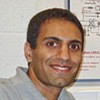
It used to be that we built electronic systems to interact with specific users: taking inputs, providing outputs. Seeing the incredible value that electronics has brought to so many applications, today we would like to build system that interact with all aspects of the physical world. But, the physical world is complex, both in the number of relevant signals it presents and in the physics of how these signals encode information. This talk starts by exploring algorithmic frameworks for creating high-quality models for analyzing sensor signals when no tractable analytical models are available. The emphasis is on data-driven methods, whereby models for inference are formed from previous observations of data. The question is how ultra-low-power sensors, which will be our source for much of the interesting data in future applications, can also enable algorithmic capabilities to extensively exploit such methods. I describe our work focusing on medical-sensor applications. Next, this talk looks at the need to acquire physical signals on a very large scale, in fact much larger than current technologies are equipped to handle. We focus on an emerging technology, large-area electronics, which is based on processing thin films at low temperatures, enabling substrates that can be large and flexible. However, translation of this technology into systems requires diverse functions, such as instrumentation, computation, communication, and power management. I describe our work on large-scale infrastructure monitoring (bridges, buildings), which looks at how large-area electronics can be combined with CMOS ICs in scalable ways to enable complete systems for very large-scale sensing.
Naveen Verma received the B.A.Sc. degree in Electrical and Computer Engineering from the University of British Columbia, Vancouver, Canada in 2003, and the M.S. and Ph.D. degrees in Electrical Engineering from Massachusetts Institute of Technology in 2005 and 2009 respectively. Since July 2009 he has been an Assistant Professor of Electrical Engineering at Princeton University. His research focuses on advanced sensing systems, including low-voltage digital logic and SRAMs, low-noise analog instrumentation and data-conversion, large-area sensing systems based on flexible electronics, and low-energy algorithms for embedded inference, especially for medical applications. Prof. Verma is recipient or co-recipient of the 2006 DAC/ISSCC Student Design Contest Award, 2008 ISSCC Jack Kilby Paper Award, 2012 Princeton Innovation Forum 1st Prize, 2012 Alfred Rheinstein Junior Faculty Award, 2013 NSF CAREER Award, 2013 Intel Early Career Award, 2013 VLSI Symposium Best Student Paper Award, and 2014 AFOSR Young Investigator Award.
